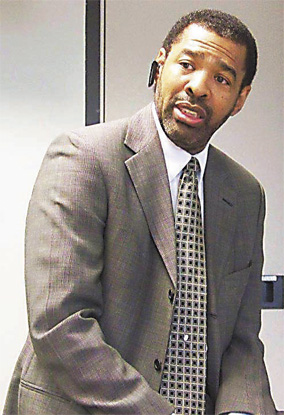EYE ON BUSINESS: Time for us to hold a stimulating conversation on black businesses
May 11, 2015 by Las Vegas Black Image Magazine
Filed under Conversation
Why are African-Americans being left behind in America’s economic recovery?
BY ERNEST FOUNTAIN
So few African-Americans are acquainted with the inner workings of America’s $17.7 trillion economy — only 4.5 percent of an estimated 42 million black people own businesses, with another 6.5 percent working in financial services — that only a relative handful of us fully understand the forces that are dragging down African-American entrepreneurship and stagnating wealth in our community.
Most of us simply have not been exposed to the process through which business components work together to create economic power. If we did understand, it’s unlikely we would remain at the bottom of virtually every economic category.
Some of those mostly unseen but nonetheless destructive forces emerge from unlikely places. Take the $787 billion American Recovery and Reinvestment Act, otherwise known as the stimulus package signed into law by President Obama in 2009. Formulated by Democrats — without a single Republican vote in the House of Representatives, and only two in the Senate — the bill was passed with no minority participation requirements passed down to the states. As a result, blacks received less than 1.4 percent of these funds. If any economic concerns require stimulation, surely black businesses would top the list: we have always been last in access to capital and last in both public and private sector contracts.
Another disturbing aspect of the stimulus bill was the increase in funding to the Small Business Administration (SBA), the Economic Development Administration (EDA) and other federal agencies. What was left without an extra penny? Nothing less than the Minority Business Development Agency (MBDA), the only agency of its kind. While it has assisted millions of minority businesses across the country in business consulting, accessing capital and securing contracts, the agency’s funding has been stagnant since President Clinton slashed its budget from $60 million to $30 million in 1992.
Over the last eight years, black businesses have received between two and three percent of all SBA loans — last among all ethnic groups. Further, small business size standards were increased in 2014; today, many businesses once
classified large are now considered small based on the increase in revenue. In fact, over 209 industries’ revenue limitations were increased. What this means is that large firms have more capacity than smaller ones, and therefore a bank is going to loan money to those firms with more capacity to repay and provide collateral. And if blacks were not receiving loans under the old size standards, even fewer will receive them when forced to compete against the influx of moneyed businesses.
Another significant change: the nature of the personal asset test, which restricted the amount of personal liquidity (cash, stock, bonds, retirement) that a borrower could possess. Under the original rules, personal assets could not exceed 1.5 times of the total project cost — meaning that if the project was worth $5 million, you were allowed to have up to $7.5 million in liquidity. Well, that rule was completed removed. Now, a person with $50 million in personal liquidity is allowed to borrow $5 million from the SBA. Once again: the bank will choose the person with $50 million over me or you.
Size standards are based on revenue for most industries; for others, it’s number of employees. The SBA is also proposing that some employee-based size standards be increased. Currently, employers with between 500 to 1,500 employees are classified as small businesses. If we are already last, the more large businesses that are qualified to participate in small business pool, the less likely we will be approved under the SBA lending programs.
The size standard for the SBA’s 504 loan program was doubled in 2010, when the net worth of the company increased from $7.5 million to $15 million and the net profits increased from $2.5 million to $5 million.
We must wake up!






